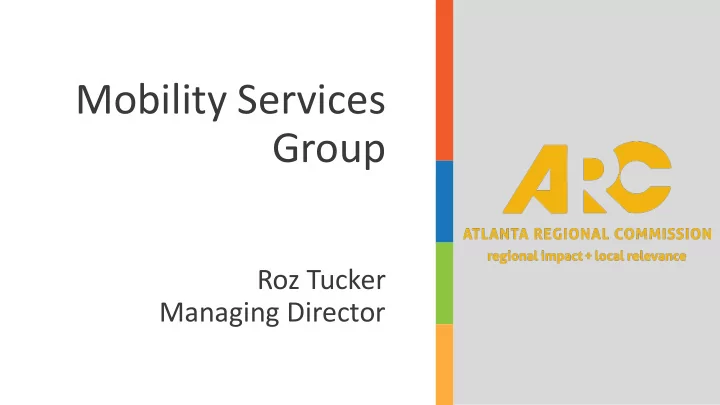

Mobility Services Group Roz Tucker Managing Director
The Mobility Services Core Team Delivering TDM to the Atlanta Region
Rosalind Tucker Managing Director Mobility Services Group Rebecca Apter Administration Employer Services, Evaluation and Marketing & Ridematching Special Projects Incentives Technology Jill Goldberg Vacant Vacant Sr. Principal Program Marketing & Principal Program Communications Specialist Specialist Director Joel Wascher Kurl Cason Bennett Foster Joseph Yawn Casey Sloan Stephanie Washington Senior Program Program Project Program Project Program Data Analyst Data Analyst Specialist Analyst Project Coordinator Coordinator Senior Olivia Haas Vacant Andrew Cuadrado Marketing & Sr. Program Management Communications Specialist Services Tech., Sr. Analyst Matthew Mills Technology Support Coordinator
Consultant Teams Employer Services & Marketing & Evaluation & Monitoring Ride-Matching School Outreach Communications Performance Methods Technology & Incentives PRIME PRIME PRIME
ARC Regional TDM Program
TDM Program Funding Flow Federal Highway Administration Georgia Department of Transportation Atlanta Regional Commission Transportation Management Georgia Commute Options Associations
The Atlanta Region’s Plan “governs and contributes to the work we do”
Transportation Demand Management Coordinating Committee (TDMCC) Structure • Mobility Services Manager serves as chair for first year ARC Board of Directors • Similar structure to TCC • New committee to review structure in 2020 Transportation & Air Quality • Currently identified as TDM Advisory Committee Committee within TCC according to Unified Transportation Plan TCC RTC TDM CC • Meets every other month (six per year) Proposed Function Buckets 1.Technology/Innovation TDM CC 2.Research/Policy 3.Equity 4.Marketing/Communications
What is TDM? Transportation Demand Management (TDM): The use of strategies to inform and encourage travelers to maximize the efficiency of a transportation system leading to improved mobility, reduced congestion, and lower vehicle emissions.
Transportation Demand Management g
Benefits of TDM Real Options for Improved Public Health & Safety Commuters Connecting People to Reduced Traffic Jobs & Supporting Congestion Economic Activity
What We Do
Mobility Services Transportation Demand Management (Regional Coordination, TMA-TDM Funding, TDM CC) Georgia Commute Options (GCO) (Employer Engagement, Marketing, Incentives, Evaluation) Georgia Commute Schools (District/School Partnerships, Modal Promos)
721 Employer Partners (comprised of more than 300,000 employees across the 19 county area) Regional Employer Strategic Outreach Outreach Guide Approach
Regional Modal Promotions
Regional Training Seminars
Value of the TDM Network to the Regional Transit Partners TMA Pass Sales to Employers
Employer Pass Purchases – Combined Annual Totals
Xpress Marta Gwinnett Cobb Linc
Successful City & County Partnerships • Regional TDM coordination • Drafted a Local Government TDM Guide • Construction Mitigation project development and coordination • Project research and analysis • Commuter/Employer surveys • Commuter marketing demographic/segmentation • Travel time/cost analysis • Trip origin and destination identification • Program and infrastructure improvement recommendations • Consumer marketing assistance • City/County wide Employee Flexwork programs • School system trip reduction programs
Our Regional Transit Partners
Evaluation
Moving Forward - 2020 2020 Guiding Principles ARC and its partners will follow four guiding principles in 2020 to deliver a new TDM Connect TDM Goals Estimate and to Regional Emphasize Evaluation Framework. Plans and the Value Goals of TDM The evaluation framework is intended to broaden the set of TDM strategies and infuse flexibility into how these strategies are measured and reported to better reflect local conditions. By doing so, the evaluation framework supports a more agile and Measure Assess Performance comprehensive approach to performance Performance Against Actions by Outcomes that Influence Behavior evaluation. Change
Moving Forward - 2020 Planning - Implementation - Evaluation Cycle Moving forward, the Regional TDM Program evaluation will: • Move away from input measures as a proxy for behavior change. • Move towards outcome-focused goals and measures that show behavior change and program benefits • Report program effectiveness for decision makers, employers and the public
Regional Commuter Survey: Objectives Conducted every 3 to 5 years through the regional Transportation Demand Management (TDM) program, currently Georgia Commute Options (GCO) • Understand commute travel patterns of employed (18+) residents of the Atlanta Region • Understand incentives for and barriers to alternative mode use • Understand awareness about and usage of commute options programs and services • Establish performance baselines for the regional TDM program
Regional Commuter Survey: Design • Address based sample approach within the 19 county region • Sampling plan takes residence and workplace into account • Aimed for oversample of workers in TMA territories • Design consistent with prior Regional Commuter Surveys • Survey goal was 5000 respondents. We received 5100 surveys back from around the region.
Regional Commuter Survey: Residential and Work Areas Work Residential
Regional Commuter Survey: Schedule for Release • Final 2019 RCS Technical Report (Feb ‘20) • Final 2019 RCS Summary Report (Feb ‘20) • RCS Data Portal: Develop, Test, and Release (Q1 & Q2 ‘20)
Marketing and Communications
Phase 1 Campaign Creative • The Drive Change campaign launched in late April 2018 • The focus of Phase 1 was to create and expand brand awareness of GCO. We wanted to get consumers thinking about their commute and move them into the first stage of the funnel towards making behavioral change in the way that they get to work. • We used broad messaging in order to make people aware of GCO and our offerings and to get people to realize that there are alternatives to driving in a SOV each day to work.
Drive Change Campaign 2019 Campaign Creative Refresh • Refreshed creative in media. Launched new website in April 2019. • Built upon the momentum of awareness that the Drive Change campaign has generated since its launch in 2018, with a focus on incentives and rewards. • Refined and refreshed creative design as well as tweaked messaging to move consumers from general awareness further down the funnel into the consideration and action ( behavior change ).
New Ride Matching and Trip Planning Technology Selected a new service provider (Agile Mile) • Integration with others – bike shares, scooters, Lyft/Uber, • Waze Carpool, etc. User friendly • Fully capable app • Enhanced incentives • Incorporated Guaranteed Ride Home (GRH) solutions • Relevant and streamlined reporting capabilities •
MyGaCommuteOptions.com
Recommend
More recommend